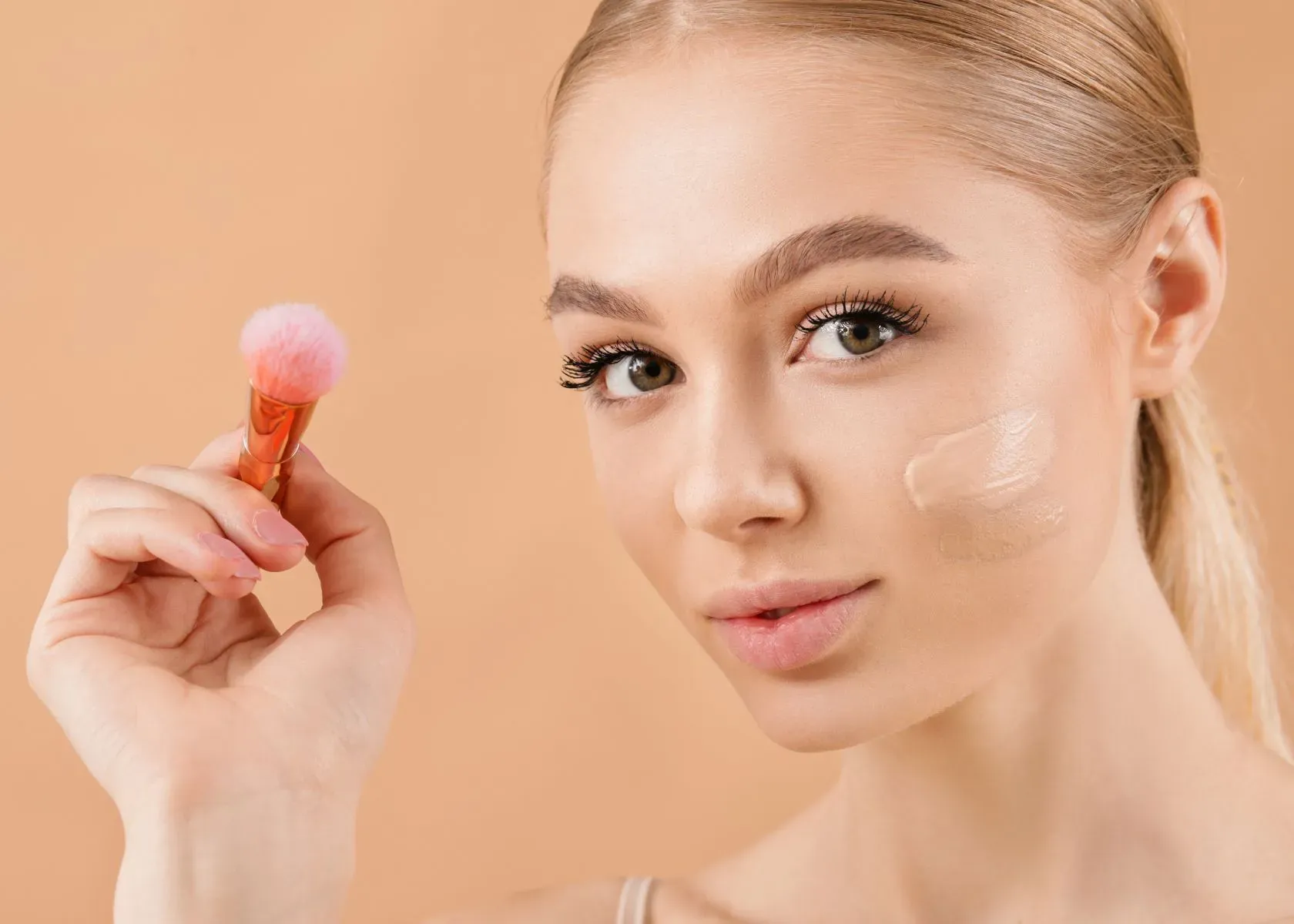Navigating the beauty aisle can be a daunting experience, with rows of foundation bottles each boasting the perfect complexion. It's enough to make your head spin! But beyond the eye-catching labels and promises of perfection lies a critical detail that could change your makeup game: the base ingredient of your foundation.
You might not think much about it as you scan the shelves, but I learned firsthand that this little detail makes a huge difference. Turns out, if your foundation lists water at or near the top of its ingredients, chances are it's water-based.
In this blog post, we're going to demystify how to spot these foundations and explain why pairing them with the right primer is key for that coveted flawless look. So buckle up - clear choices in makeup are just around the corner!
- You can tell if a foundation is water-based by checking the ingredients list for water near the top, indicating that it's likely a water-based formula.
- Water-based foundations have a lightweight, liquid consistency and provide natural coverage suitable for sensitive or acne-prone skin.
- If makeup sits on your skin instead of blending in, you may be using a silicone - based foundation as they have thicker textures and create barriers on the skin.
- Pairing your water - based foundation with a matching primer not only enhances its staying power but also optimizes its overall performance on specific skin types.
Understanding Different Types of Foundations

Water-based foundations, silicone-based foundations, and oil-based foundations are the main types of foundation formulas.
Water-Based Foundations
I often turn to water-based foundations when I want a natural and breathable look for my skin. These foundations blend seamlessly, giving a light coverage that enhances my complexion without the heavy feeling some makeup can have.
The ingredients in these products usually have water listed near the top of the list, which means they're packed with hydration like hyaluronic acid—perfect for keeping dry or mature skin looking fresh and dewy.
Applying them is a breeze because of their liquid consistency; they just glide onto the skin. I especially appreciate how this type suits my sensitive skin since it's less likely to clog pores or cause breakouts compared to other types.
Plus, at the end of a long day, I find these foundations easier to wash off—a simple cleanser does the trick without any fuss.
For those with oily or combination skin type like mine, pairing a water-based foundation with a matching primer helps control shine throughout the day. It absorbs excess oil while leaving your face smooth and ready for an even application of color.
Choosing these hydrating beauty products makes all-day wear comfortable while promoting healthier-looking skin over time.
Silicone-Based Foundations
Moving on to silicone-based foundations, these products often contain ingredients that end in “cone” or include “silo.” This type of foundation is typically known for its smooth application and silky texture.
Silicone-based makeup products like silicone based primers can create a soft-focus effect, blurring imperfections and fine lines for a flawless finish.
Silicone foundation is great for providing a long-lasting look as they tend to be more resistant to sweat and oil. They glide effortlessly onto the skin, offering a velvety feel and creating a smooth base for makeup application.
Additionally, silicone-based foundations are well-suited for those with normal to oily skin types due to their mattifying properties which help control shine throughout the day.
Oil-Based Foundations
Transitioning from silicone-based to oil-based foundations, it's important to note that oil-based formulas are richer and provide a dewy finish. These foundations often contain nourishing oils such as almond, avocado, or coconut oil, making them ideal for dry or mature skin types.
When examining the ingredient label of a foundation product, look for terms like "oil," "butter," or specific types of oils in the list to identify an oil-based formula. Unlike water-based foundations, oil-based ones may feel heavier on the skin but offer excellent hydration and coverage for those seeking a luminous complexion without looking greasy.
Oil-based foundation creates a protective barrier on the skin and help lock in moisture throughout the day. Due to their emollient properties, they work well for individuals with dry or dehydrated skin by preventing moisture loss and providing a plump appearance.
Identifying the Type of Foundation You're Using

If your makeup tends to sit on top of your skin rather than blending in, it may be a sign that you're using a silicone-based foundation instead of water-based.
Why Makeup May Sit on Top of Your Skin?
Water-based foundations are formulated with a higher water content, allowing them to blend seamlessly into the skin. This ensures that makeup doesn't just sit on top of your skin, but rather becomes part of it for a more natural look.
The lightweight and liquid consistency of water-based foundation makes it easier to spread and less likely to clog pores, resulting in comfortable wear throughout the day. Additionally, these foundations are ideal for individuals with sensitive or acne-prone skin as they are less likely to cause breakouts.
Silicone-based primer and foundations, on the other hand, may sit on top of the skin due to their thicker texture and silicone ingredients that create a barrier between the makeup and the skin's surface.
Need for Primer
According to professional makeup artist, if makeup tends to sit on top of your skin, a primer may be the missing link in your routine. Primers, either water based or silicone based create a smooth base for foundation application by filling in pores and fine lines, helping the product to adhere better to the skin.
For water-based foundation specifically, using a water-based primer can enhance the longevity of your makeup while providing additional hydration. This is crucial for those with dry or mature skin type as it helps prevent flakiness and ensures a more even application.
Additionally, if you have oily or combination skin, a water-based primer can help control excess oil and shine throughout the day. By creating a barrier between your skin and makeup, it also minimizes clogged pores and potential breakouts.
Key Characteristics of Water, Silicone, and Oil-Based Foundations

Water-based foundations have a lightweight formula and provide a natural finish, making them suitable for all skin types. Silicone-based primer and foundations offer a smooth and silky feel with a matte finish, ideal for those with oily skin.
Oil-based primers and foundations are rich and hydrating, great for dry skin but may not be the best option for those prone to breakouts.
How They Differ in Formula, Feel, and Finish?
Water-based foundations have a lightweight formula that feels airy and breathable on the skin. They often provide a natural, dewy finish, making them ideal for those seeking a fresh and radiant look.
Silicone-based primers and foundations, on the other hand, have a silky-smooth formula that glides effortlessly onto the skin. They offer a velvety finish with a blurring effect, perfect for creating a flawless complexion with minimized pores and imperfections.
Which Skin Types Are Best For?
Water-based primers and foundations are best suited for individuals with oily or combination skin. The lightweight formula helps control excess oil and shine, making it an excellent choice for those prone to greasy skin throughout the day.
Additionally, water-based makeup products are less likely to clog pores, making them suitable for those with sensitive or acne-prone skin. Furthermore, their hydrating properties make water-based foundations a great option for individuals with dry or mature skin, providing a natural look without drying out the complexion.
Silicone-based foundations are ideal for those looking to create a smooth and flawless finish as they help fill in fine lines and imperfections. This type of foundation is also beneficial for individuals with normal to dry skin as it offers long-lasting coverage and provides a barrier against moisture loss.
Frequently Asked Questions
As someone who enjoys experimenting with different makeup products, I'm often asked how to determine if a foundation is water-based or not. It's an important question because water-based and oil-based foundations perform quite differently on the skin. Choosing the right base is crucial for getting that smooth, flawless finish we all want from our foundation.
In this FAQ, I'll draw from my own trial-and-error experiences to provide tips on recognizing water-based foundations by sight, texture, ingredients, and feel on the skin.
What's the main difference between water-based and silicone-based foundation?
Water-based foundations are made with water as the first ingredient and feel lighter on the skin, while silicone-based foundations usually start with 'dimethicone' in their ingredients and have a smoother finish.
How can I find out if my foundation is water-based?
Check your foundation’s ingredient list for water or aqua listed at the top, which indicates it is water-based; oil or silicone will not be primary components.
Is a water-based primer necessary for using it under my makeup?
Using a water-based primer provides an even base, especially if you are applying other types of cosmetics like silicones to your skincare routine.
Can people with oily skin benefit from using a water based foundation?
Yes! Water-based foundations are often recommended for those having oily skin because they tend to be non-greasy and can help control shine better than oil-based or silicone based products.
Are there particular advantages of choosing a Water Based product over others for dry skin?
Water-based makeup generally helps hydrate dry skin more effectively than other types due to its moisture-retaining properties, which provide longer-lasting comfort throughout the day.
Conclusion
Identifying if a foundation is water-based involves understanding its characteristics and ingredients. By paying attention to the texture, formula, and finish of the foundation, one can determine if it's water-based. Also, if you find silicone as second or third ingredient, it is silicone-based.
This practical approach allows for efficient selection of suitable makeup products tailored to individual skin types. Have you considered incorporating these strategies into your beauty routine? It could lead to significant improvements in skincare and makeup application.
For further exploration of foundation types and skincare, seek out additional resources or professional guidance. Take charge of your skincare routine by making informed choices when selecting foundations based on their composition and benefits – your skin will thank you for it.
Share with us in the comments below what type of foundation you use regularly.
References
- Bouslimani, A., da Silva, R., Kosciolek, T., Janssen, S., Callewaert, C., Amir, A., ... & Knight, R. (2019). The impact of skin care products on skin chemistry and microbiome dynamics. BMC Biology, 17(1). DOI: 10.1186/s12915-019-0660-6.
- Claire Talks Beauty. (n.d.). They feel lightweight. In 5 Amazing Benefits of Water-Based Foundations.
Learn More About Water Based Foundations





